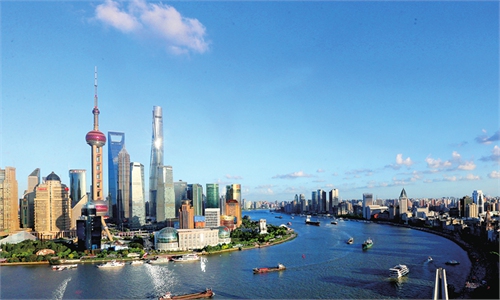IN-DEPTH / IN-DEPTH
Shanghai expats find creative ways to boost morale, bond with locals in Omicron fight
Stay upbeat
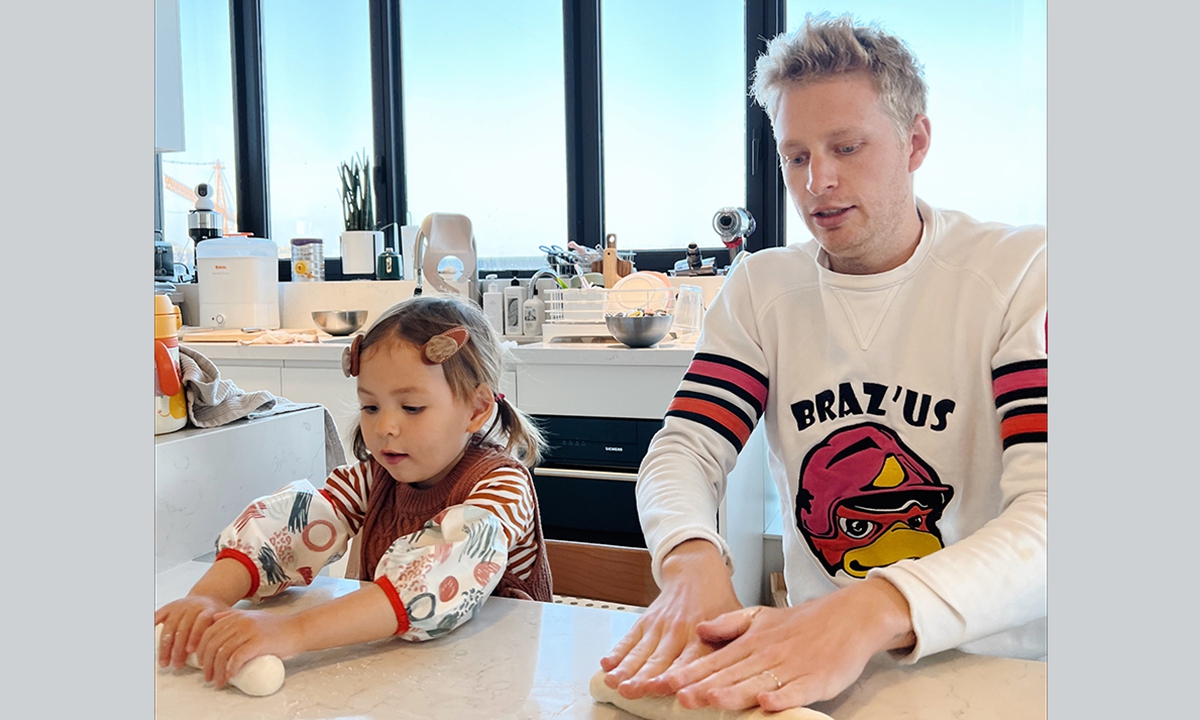
Franco-Belgian photographer Maxim van den Nieuwenhuijzen and his daughter Lilly, make bread during their home quarantine on April 4. Photo: Courtesy of van den Nieuwenhuijzen
At present, the Shanghai epidemic prevention and control battle is at a critical stage. As an international trading and cultural hub with a wide range of cultures, the sudden pause in this cosmopolis has tugged at the heartstrings of the world.
Meanwhile, people in Shanghai, which is known as the "Magic City," have shown their unique attitude toward this sudden challenge in their lives. Be they foreign volunteers who have joined the comprehensive anti-epidemic action in their respective communities, or those who have tried to follow recommended protocols with optimism, as well as people who have continued to live their Shanghai-style lives, the city offers examples of resilience and a determination to fight at every turn.
The Global Times presents different stories unfolding during the current anti-epidemic battle in Shanghai, to showcase the city's tenderness, optimism, and diversity. This is the second installment.
As one of China's biggest expatriate hubs went into a "pause," expat residents living in Shanghai instead of being frustrated or weary, were positive, inspiring, and innovative in how they chose to face life in quarantine, encouraging each other and their Chinese counterparts amid the megacity's serious outbreaks and city-wide "static management."
Despite widespread reporting by Western media outlets on the frustrations of expats in Shanghai who were allegedly rethinking their lives in the megacity, expats quarantined at home reached by the Global Times gave pushback on the narrative as they find innovative ways to overcome current challenges and firmly stand with the city's indomitable fight against the epidemic. Though experiencing an emotional roller coaster with concerns and anxieties, as are many local residents, these expats still express understanding of the necessity of the dynamic "zero-COVID" policy. To counter feelings of isolation, boredom, and worry, the expats have been live-streaming home-based feasts and balcony cocktail parties, joining bulk-buying groups, supporting community volunteering works, and even providing the truth behind an otherwise skewed Western coverage of Shanghai's citywide static management. Many of them are the only foreigners in their buildings, but they are not alone - taking this opportunity to become more involved in the community and develop a communal affinity that was not present before.
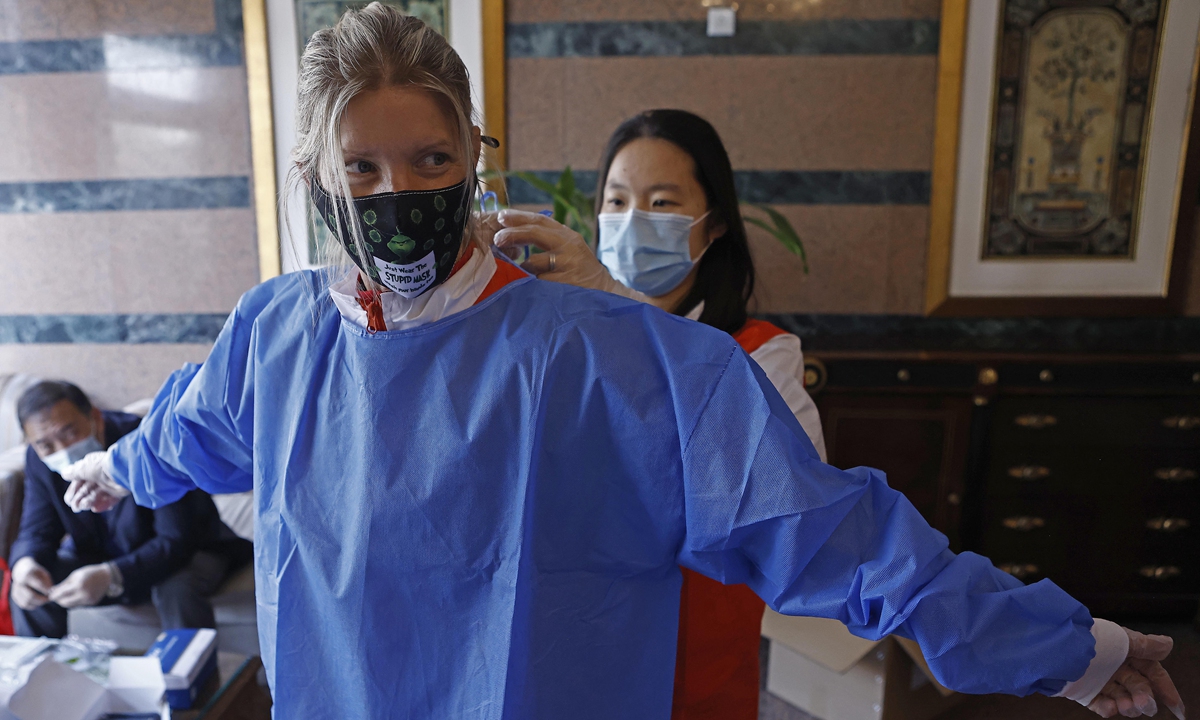
Chinese volunteers in Huashan Huayuan community help Erika, a volunteer from the US, put on her personal protective suit in Shanghai, on April 6. Photo: IC
Standing against bias
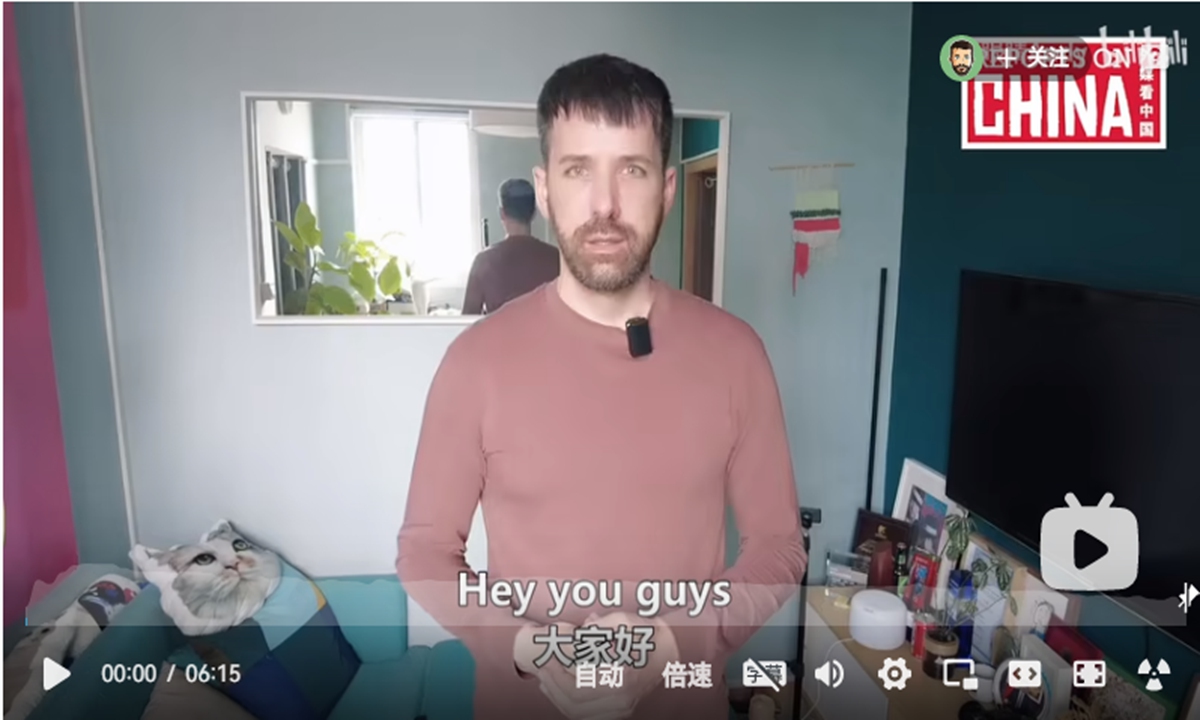
Andy Boreham films a short video on social media to explain his quarantine life and Shanghai's anti-COVID policies. Photo: Screenshot of Boreham's Bilibili account
Andy Boreham, a veteran video journalist from New Zealand who is working in Shanghai, is the only expat in his block.But being proficient in Putonghua and Chinese reading has made him less worried over the past 23 days of quarantine. He joined many bulk-buying WeChat groups and bartered goods with neighbors in his building. "I feel embarrassed to say this, but in around five years of living in this compound, I haven't had that much to do with my neighbors. Over the past few weeks I've made some new friends through all the WeChat groups we have set up, and everyone is really getting together to make sure we are all good. So many people have added my WeChat and asked if I need anything, which is really heartwarming. I feel that this situation has definitely pulled us together, which we all know isn't that common in inner-city apartment living," said Boreham.
He has also given food away to neighbors as he sent over a huge bag of fresh vegetables - treasures in this special period in the city - when he realized that his block has 12 young people living in a single apartment which got him "a bit worried about whether or not they have enough supplies or need anything."
Boreham however said he once felt frustrated and angry when he learned of a pet corgi being beaten to death over suspicions that it was a virus-carrying risk in Pudong as he worried about the safety of his two cats should something happen to him.
"At that time I contacted my neighborhood committee directly and made them promise my cats would not be hurt and that someone would look after them if I ended up catching COVID," Boreham told the Global Times.
"But overall I was really confident that Shanghai could handle it. Even though we hadn't had a large-scale outbreak before, our experts have built up two years of knowledge dealing with returning Chinese nationals, including those bound for other Chinese cities."
As a reporter, Boreham recently used 11 tweets to clarify things to BBC's correspondent Robin Brant who painted a one-sided picture about the clash between police and residents in Shanghai.
Boreham has found that Brant sometimes "completely misrepresents facts and figures, or leaves out extremely important context in order to satisfy the BBC audience's hunger" for what Boreham calls "China-bad porn".
"I can somewhat understand overseas reporters getting their reports on the situation in Shanghai wrong, but I can't tolerate it from a man who lives here in Shanghai and most certainly has Chinese colleagues by his side who could help make up for his deep lack of understanding of Chinese culture and the Chinese language," said Boreham.
"Even though my job includes following Western media coverage of China, I have more or less tried my best to stay away during this lockdown, probably because I know exactly what I will find. Western media coverage of China during good times is bad enough, let alone when the city is really struggling," he said.
"The West has ceaselessly attacked China's zero-COVID policy from the very start. However, while more than one million people have died in the US, as just one example, much of China has gone about life nearly normally and with just a tiny fraction of the number of deaths."
Shanghai has no choice but to defeat this outbreak. Omicron is a terrifying opponent, though, so it won't be without losses, Boreham noted.
Recipes during isolation
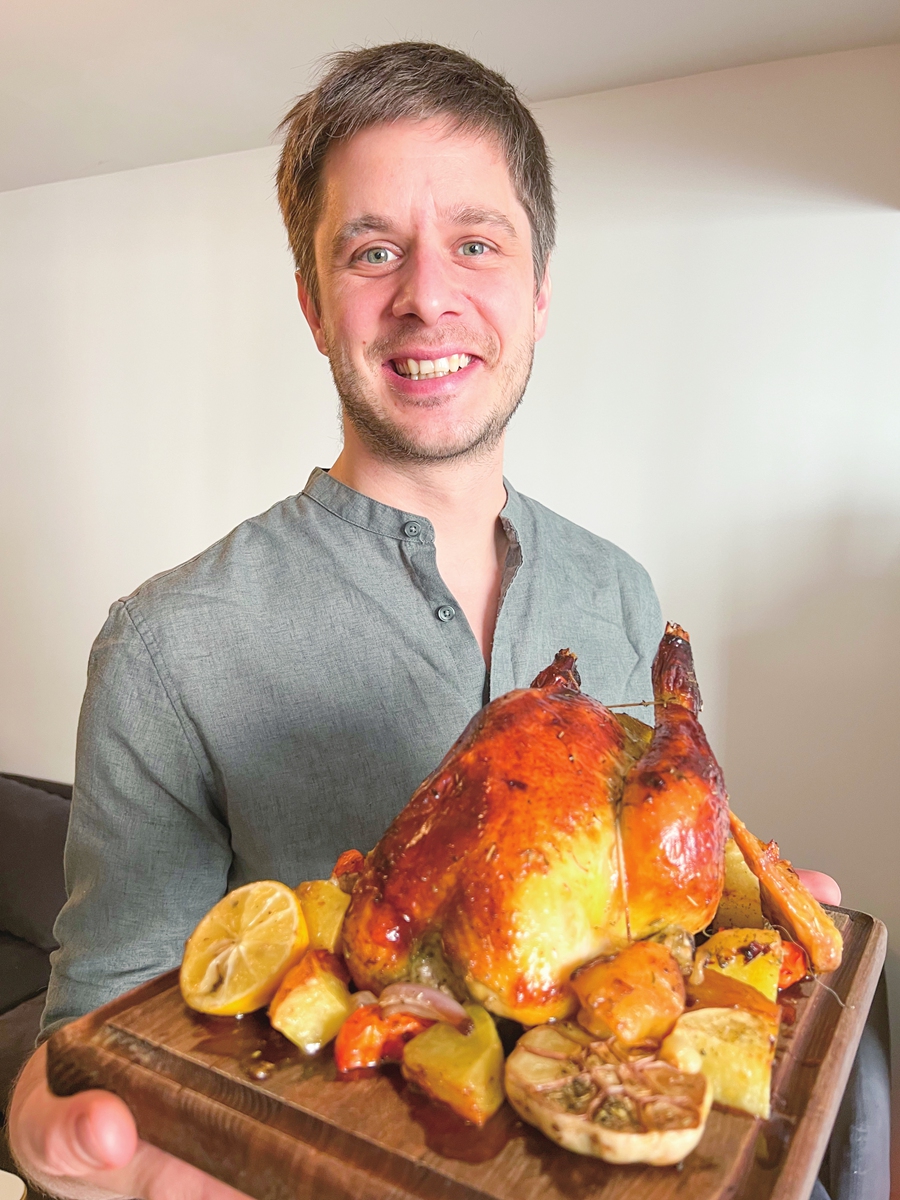
Chef Corentin Delcroix shows off a roasted chicken made during quarantine. Photo: Courtesy of Delcroix
While isolated at home, what can you do with just eggs and chocolate? Chef Corentin Delcroix, who has lived in Shanghai for 14 years, posted a video on social media platforms, teaching people how to make a chocolate cake with just these two simple ingredients."We only have eggs, chocolate, and flours. Now my child could have a special 10-year-old birthday cake," a netizen commented under his video.
Delcroix is known as Chef Guangtan in China, as he has appeared on many TV programs, and has nearly 4 million followers on various social platforms. Having graduated from the world-famous Institut Paul Bocuse, Delcroix also runs a business specializing in food research in Shanghai.
For him, it has been a pity to see his beloved city enter a pause because of the COVID-19 epidemic, and in particular, seeing some netizens' prejudice and attacks toward Shanghai and the Shanghai people that made him feel very sad.
In his view, Shanghai is a vibrant and fast-paced city, making it an excellent choice for entrepreneurs. At the same time, he also appreciates that Shanghai can not only accept different cultures, but has also retained its original characteristics.
"I have seen the solidarity and hard work of Shanghai's residents during the epidemic. Everyone has been doing their best to help others, and they are also optimistic," he told the Global Times.
The Delcroix family, which lives in Huangpu district, was also hit by the shortage of supplies in the early days of the lockdown. "Fortunately, I'm a chef, and I still have some reserves at home. But for a while, I could only eat eggs and cabbage, or cabbage and eggs."
Under such circumstances, Delcroix began to think about how to make delicious food with a few simple ingredients due to limited conditions. He started to publish "Home Cooking Recipes."
Apart from the "Simple Chocolate Cake," he also taught followers to make "Self-Sufficient Mixed Fried Noodles," "Cabbage Cake," or "Vegetarian Crab Xiao Long Bao." He even shared how to make tofu and sauerkraut at home.
He said that seeing people's feedback which told him "they learned how to make this food" made him feel particularly happy.
This experience also gave Delcroix some insight into the way of life of modern people. "The supply of materials for people in the city is so rich now. Many people don't know how precious the foods are, and feel that it's okay to waste a little bit. This time at home has made everyone realize how precious a fresh cucumber is."
Delcroix said he thanked the volunteers and the government for their efforts. He can also understand the serious attitude of the Chinese government toward the epidemic.
"Seeing such a high death toll in France or the US, even if we are not doctors or professionals, makes us appreciate the differences," he said. "I think if the lives of those old people can be saved, even if we are quarantined for three weeks or a month, it's just some meaningful little thing we can do."
Learning real Chinese culture
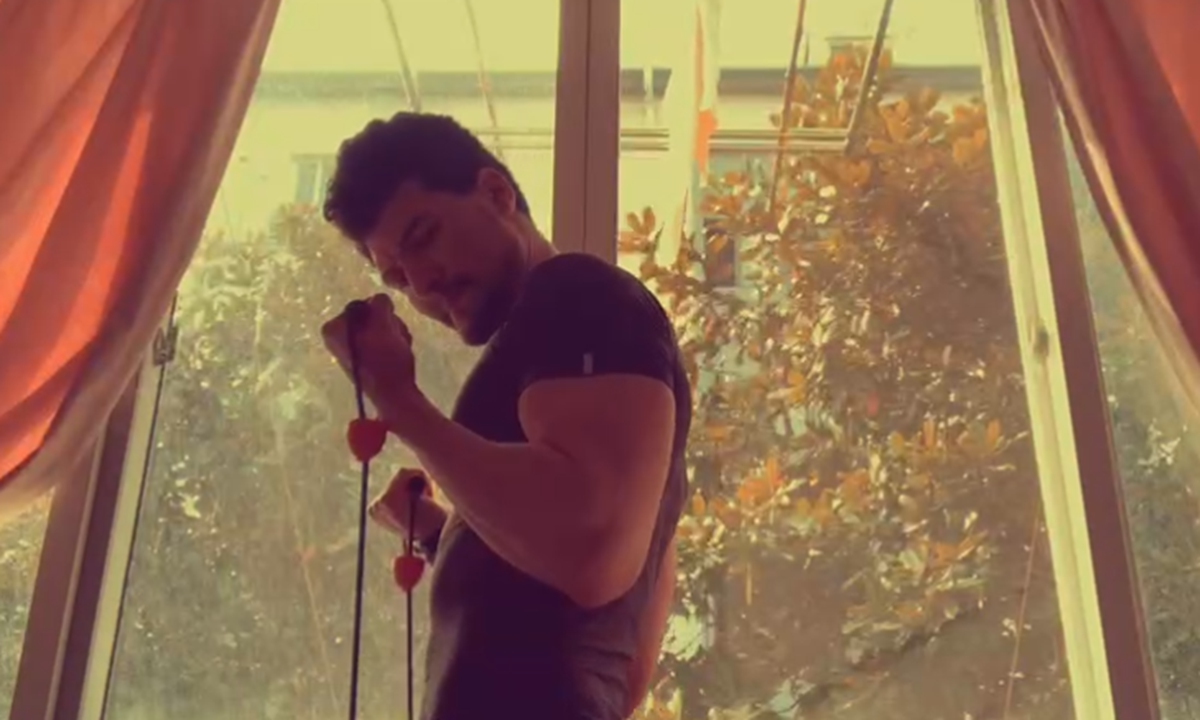
Mahmoud Soliman works out at home in mid-March. Photo: Screenshot of Mahmoud's home video
Mahmoud Soliman, an Egyptian national teaching interpretation (translation) and Arabic at the Shanghai International Studies University (SISU), told the Global Times that he began to understand the profundity of Chinese culture better through interactions with his neighbors and the local community in the latest fight against the coronavirus disease.Mahmoud appreciated the free food and snacks received from his neighbors as he didn't prepare too much food before the lockdown. "I now understand the meaning of the Chinese characters of "friend" (pengyou) much better. "Peng" is composed of two moons, and in ancient Chinese Hieroglyphs, the character looks like the character of meat. "You" is made up of two people standing hand in hand. During the lockdown, friendship is vividly expressed in the way described in the Chinese character of friends (or even strangers) and how they share meat and other food, and stand hand in hand."
His five-year stay in Shanghai made him love and integrate into this inclusive and dynamic international city, he said.
Concerning the foreign media's criticism of Shanghai's the current dynamic zero-COVID policy in Shanghai, Mahmoud said that those people who don't live and work in Shanghai and China can't understand the true meaning and significance of China's "people first, life first" anti-epidemic principle. "Based on China's huge population, the country needs to cherish the life of every individual, be they young or old. Only when collective health is guaranteed, can China achieve stability, development, and prosperity. I would say other countries should learn from China at this point to fight against the virus and safeguard people's lives."
Mahmoud emphasized that "The Chinese dabai (volunteers in white uniform) made pivotal contributions to the anti-virus efforts, they deserve respect, and their efforts and spirit of sacrifice should be emulated by other countries in the world."
"If I can only use one word to conclude the experience and feelings I've had during the lockdown, it must be the Chinese character '您' (nin), it's the honorific you. You can see that it's you in my heart. That's the sincere thanks and tribute I'd give to the volunteers and all those who are helping combat the virus," Mahmoud told the Global Times, "I also joined the volunteer team in my neighborhood, but even SISU didn't know as in Egypt, we also encourage people to do good deeds without telling others. I help distribute food and other necessities to residents. I'm glad to lend a hand."
Mahmoud said that although he missed all the delicious food and snack and convenient delivery services before the lockdown, he enjoyed the current "healthier" lifestyle as he has to prepare food by himself. As a teacher, he misses his students a lot, "so long as they ask me to communicate with them, I gladly share my lockdown life with them and encourage them to do more indoor exercise and maintain a healthy lifestyle under lockdown. I make videos of my lockdown life and share them with my students, and I hope they help."
"The first thing I would do once the lockdown is lifted is to meet my students in SISU's Songjiang campus," Mahmoud said.





